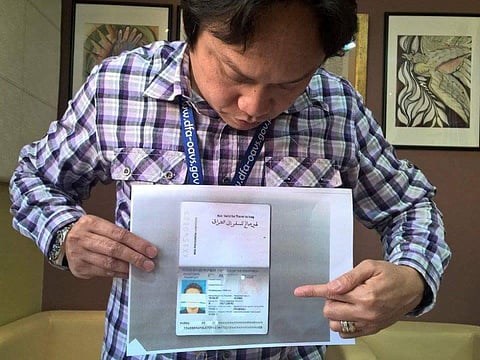Filipinos warned against using fake passport, visas
Officials busted three incidents in one month prompting them to issue official warning

Dubai: Officials in Dubai have warned Filipinos against resorting to buying fake passports and fake UAE visas — a criminal act that can land them in trouble.
Consulate officials busted three cases involving fake documents this month, including two fake UAE visas, Philippine Consulate-General Paul Raymund Cortes told the media on Wednesday night.
“What is very clear is you have a whole network of lies [by con men] not just in Dubai, but in the malls in the Philippines, in the provinces back home … they all collude so that people can come to Dubai and work,” Cortes said.
In the UAE, a person who forges a travel document such as a passport and uses it could face between one month and five years in jail, depending on the judge’s discretion, according to the UAE Penal Code.
Consul Ferdinand Flores said the first case involved a woman who resorted to fixers in the Philippines to buy a passport for a baby girl, aged between one and two years, under her care. The baby’s parents are believed to have entrusted the baby to her and left the country for good.
“There were too many red flags. They tried doing it using an e-passport but the e-passport has a microchip. So you would know and would feel the missing chip if you touched it. The details also were very suspicious so we had to confiscate the fake passport,” Flores said.
Officials said the woman paid 75,000 pesos (Dh5,900) to get the baby’s fake passport so she could fly with her to the Philippines. A passport in the Philippines only costs 950 to 1,200 pesos.
Flores said the second case involved a Filipino professional working in Dubai. The suspect’s colleague complained against him at the consulate because he suspected that the passport owner had absconded and left the UAE, leaving behind a mountain of bank loans.
The suspect allegedly got a fake passport from the Philippines and gave it to his company for safekeeping and as a guarantee that he would not run away. He also made some of his colleagues at work guarantors and ran away with company money.
“This case is very complicated because when we saw the passport, it had a sticker which resembled a Dubai visa. The details are correct but printed on a fake paper and attached on a fake passport. The immigration stamps are also fake,” Flores said.
The third case involved a single mother who used a photocopy of a fake Dubai visa as a requirement for one of the services at the consulate. Flores said she obtained the document from a woman who recruited her to work in Dubai through Facebook.
Flores said Filipinos who use forged or fake documents will not get away with it as all consular staff are trained to inspect if a passport is legitimate or not.
Authorities in the UAE are also trained to spot forgery. In 2014, some 1,027 forged passports were seized at Dubai airports.
“We are revealing the modus operandi of the people who are doing this in the Philippines. This should serve as an eye-opener to Filipinos that they shouldn’t get involved in matters like this. We’ve already reported the fake visa to Dubai Police and it is already under investigation,” Flores said, adding they have reported the same to the relevant authorities in the Philippines.



